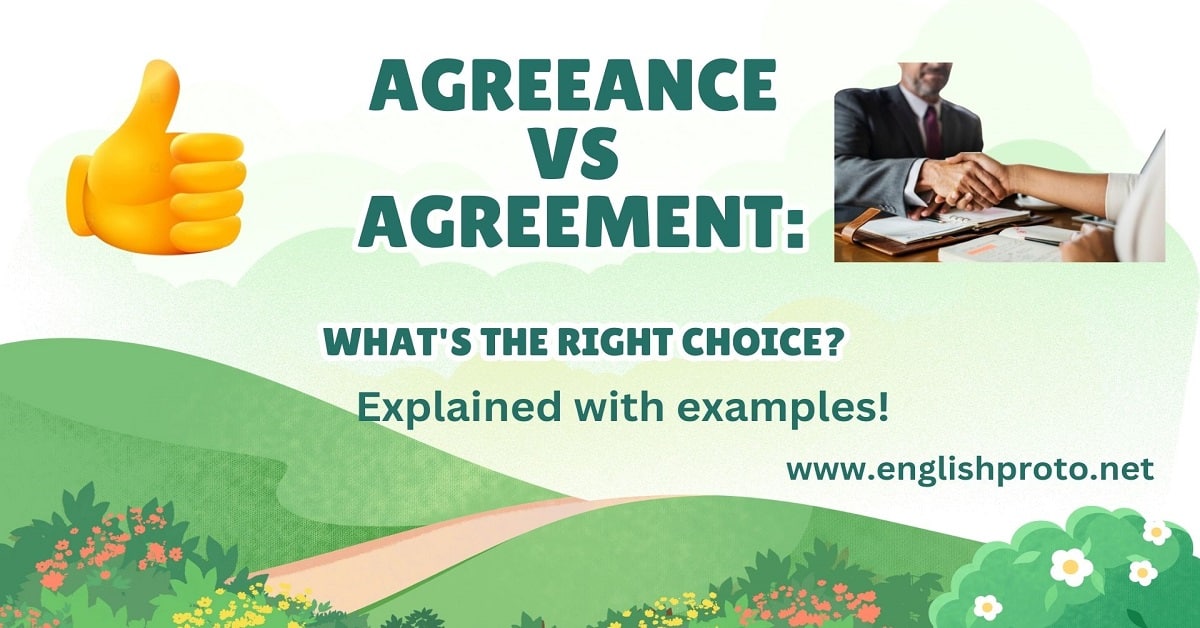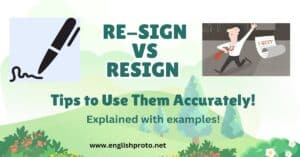Agreeance vs Agreement: What’s the Right Choice? You’re not alone if you’ve ever paused mid-sentence, wondering which of these words fits the bill. Is “agreeance” even correct, or is it just one of those words that sneak into our vocabulary without a proper invite?
It’s a subtle difference, but getting it right can sharpen your writing and leave a lasting impression. You use words every day to convey your ideas, so why not ensure you’re using the best ones?
In this article, we’ll untangle the confusion, uncover the truth behind these terms, and help you confidently choose the right word every time. Ready to master this once and for all? Let’s dive in!
Quick Summary
The correct and widely accepted term is agreement. It refers to the act of coming to a shared understanding or a formal arrangement between parties. Agreeance, on the other hand, is an archaic term that has largely fallen out of use and is considered nonstandard in modern English.
Key Takeaways:
- Agreement is the correct term for both professional and informal contexts.
- Agreeance is rarely used today and is generally avoided.
- Using the correct term ensures clarity and professionalism in your writing.
Reasons for Confusion
The confusion between agreeance and agreement can stem from various factors:
- Historical Usage: Agreeance was once a valid term but became obsolete as agreement gained popularity.
- Similarity to Other Words: Words like “compliance” or “acceptance” may lead people to assume “agreeance” is equally valid.
- Regional Variations: Some speakers in certain regions might still encounter “agreeance” in older texts or casual conversations, adding to the mix-up.
- Assumption of Correctness: People may use “agreeance” because it sounds formal or sophisticated, even though it’s incorrect.
Detailed Explanation: Agreeance vs Agreement
What Does “Agreement” Mean?
Agreement is a noun that refers to the state of being in harmony or a formal arrangement between parties. It’s used in various contexts, including:
- Personal Interactions: “We reached an agreement to meet at 5 PM.”
- Legal and Business Contexts: “The agreement outlines the terms of the partnership.”
- General Consensus: “There was general agreement among the team members.”
The term is versatile and widely recognized in both written and spoken English. Its usage transcends casual conversations, making it integral in legal, academic, and professional settings.
An agreement implies mutual consent, which is critical in areas like contract law. For example, when parties sign a contract, they are entering into a binding agreement that holds legal significance.
Similarly, in everyday situations, an agreement reflects understanding and cooperation, such as planning an event or resolving a dispute.
What About “Agreeance”?
Agreeance is an older form of the noun that meant the same as agreement. However, it became obsolete in modern English usage. Today, it’s considered nonstandard and may confuse readers who expect proper terminology.
While it’s not entirely unheard of, agreeance is typically found in older texts or used by individuals unaware of its archaic nature. For example, someone might say, “We are in agreeance,” intending to sound formal but inadvertently using a term that is no longer standard.
Why Does “Agreeance” Persist in Some Circles?
Despite its obsolescence, agreeance occasionally resurfaces in:
- Informal Speech: People may use it colloquially, mistaking it for a synonym of “agreement.”
- Historical References: Older documents, literature, or legal texts might include “agreeance,” leading some to assume it remains valid.
- Misguided Formality: Some believe it sounds more sophisticated than “agreement,” even though it detracts from clarity.
⚡ Quick Tip:
Stick to agreement in all professional and formal communications to maintain credibility and avoid potential misunderstandings.
Common Errors: Agreeance vs Agreement
Here are some incorrect variations and explanations of why they should be avoided:
| Incorrect Usage | Why It’s Wrong |
|---|---|
| “In agreeance with” | Nonstandard; use “in agreement with” instead. |
| “We have an agreeance” | Obsolete and less recognizable than “agreement.” |
| “Agreeance was reached” | Sounds archaic and may confuse modern readers. |
These errors often arise from assuming “agreeance” is a fancier or more formal version of “agreement.” However, in reality, it detracts from clarity and professionalism.
Additional Missteps to Avoid
- Using “agreeance” in official documents or academic papers. It signals a lack of awareness about current language norms.
- Mixing the terms interchangeably, which can create confusion for readers or listeners.
Synonyms or Alternatives
If you’re looking for variety in your writing, here are some alternatives to agreement:
- Consensus: Used when referring to general harmony or shared opinions. Example: “The group reached a consensus.”
- Accord: Often used in formal contexts to signify harmony. Example: “The nations signed a peace accord.”
- Contract: Specific to legally binding arrangements. Example: “They entered into a contract.”
- Understanding: Suitable for informal agreements. Example: “We have an understanding about the project.”
- Pact: Implies a formal agreement, often in political or military contexts. Example: “The allies formed a pact.”
- Arrangement: Less formal than “agreement” but conveys a similar meaning. Example: “They made an arrangement to share the workload.”
Examples in Sentences
To reinforce proper usage, here are some examples:
- Correct: “The two parties came to an agreement on the terms of the deal.”
- Correct: “In agreement with the findings, the report was approved.”
- Incorrect: “They were in agreeance with the proposal.”
Sentences Highlighting Alternatives:
- “The committee reached a consensus after hours of discussion.”
- “The countries signed an accord to end hostilities.”
- “Their understanding ensured smooth collaboration.”
⚡ Quick Tip:
If you’re unsure, replace “agreeance” with “agreement” and check if it sounds natural—it usually will!
Origins and History
The word agreeance dates back to the 16th and 17th centuries, derived from the verb “agree.” At the time, it was used interchangeably with agreement to signify harmony or mutual understanding.
However, as language evolved, agreement emerged as the preferred term due to its broader applicability and simpler construction.
By the 19th century, “agreeance” had largely fallen out of favor, relegated to archaic status. Its decline can be attributed to shifts in linguistic preferences, where conciseness and clarity became prioritized. Today, it’s rarely encountered outside of historical contexts.
Why Does Knowing This Matter?
Understanding the history of these terms highlights the importance of staying updated with language trends. Using outdated or nonstandard words like agreeance can undermine your credibility, especially in professional settings.
Why Choose “Agreement”?
- Clarity: It’s immediately recognizable and widely understood.
- Professionalism: Using the correct term ensures your writing or speech is polished.
- Modernity: Language evolves, and adhering to current norms reflects awareness and adaptability.
Conclusion: Agreeance vs Agreement
The distinction between agreeance and agreement is straightforward: stick with agreement for modern and professional writing. Understanding the difference ensures your communication remains clear, polished, and effective.
Key Points to Remember:
- Agreement is the correct and standard term.
- Avoid agreeance, as it’s outdated and nonstandard.
- Use synonyms like consensus or understanding for variety.
Mastering nuances like this not only improves your language skills but also leaves a positive impression on your audience. So, next time you’re drafting an email, contract, or essay, remember agreement is the way to go!



